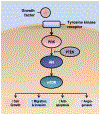The Triple Health Threat of Diabetes, Obesity, and Cancer-Epidemiology, Disparities, Mechanisms, and Interventions
- PMID: 34029445
- PMCID: PMC8152945
- DOI: 10.1002/oby.23161
The Triple Health Threat of Diabetes, Obesity, and Cancer-Epidemiology, Disparities, Mechanisms, and Interventions
Abstract
Obesity and type 2 diabetes are both chronic, relapsing, progressive diseases that are recognized as risk factors for the development of multiple types of cancer. In a recent symposium titled "Hitting A Triple-Diabetes, Obesity, and the Emerging Links to Cancer Risk," convened by The Obesity Society during ObesityWeek 2019, experts in the field presented the current science and highlighted existing research gaps. Topics included (1) the epidemiology of obesity and diabetes and their links to cancer risk; (2) racial and ethnic differences in obesity, diabetes, and cancer risk; (3) biological mechanisms common to obesity and diabetes that may increase cancer risk; and (4) innovative interventions that can be used to prevent the development of cancers related to obesity and diabetes. This report provides an overview of the symposium and describes key research gaps and pressing questions in need of answers to advance the field. The collective burden of obesity, diabetes, and cancer represents one of the largest public health challenges of the century. Although the symposium was titled "hitting a triple," it was recognized that being able to disrupt the linkages among obesity, diabetes, and cancer would be a "grand slam" for public health and medicine.
© 2021 The Obesity Society.
Figures



References
-
- Bray GA, Kim KK, Wilding JPH, World Obesity F. Obesity: a chronic relapsing progressive disease process. A position statement of the World Obesity Federation. Obes Rev 2017;18: 715–723. - PubMed
-
- Ward ZJ, Bleich SN, Cradock AL, Barrett JL, Giles CM, Flax C, et al. Projected U.S. State-Level Prevalence of Adult Obesity and Severe Obesity. N Engl J Med 2019;381: 2440–2450. - PubMed
Publication types
MeSH terms
Grants and funding
LinkOut - more resources
Full Text Sources
Other Literature Sources
Medical

